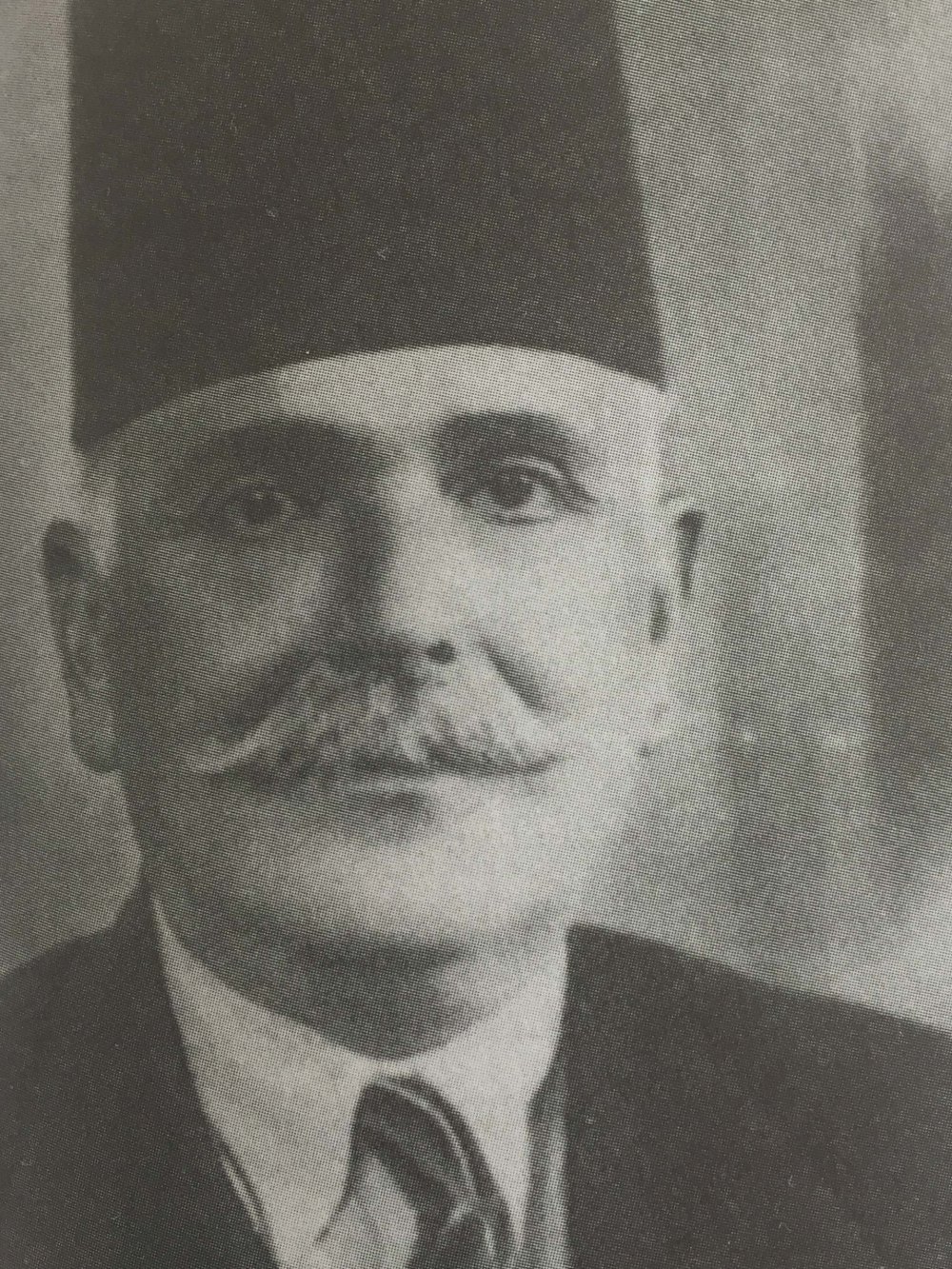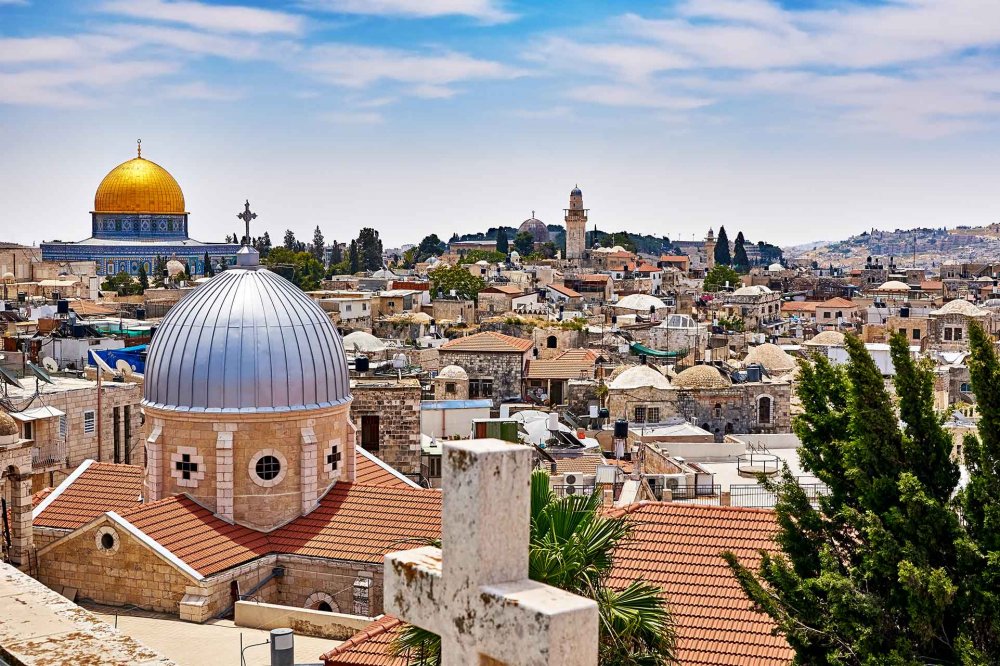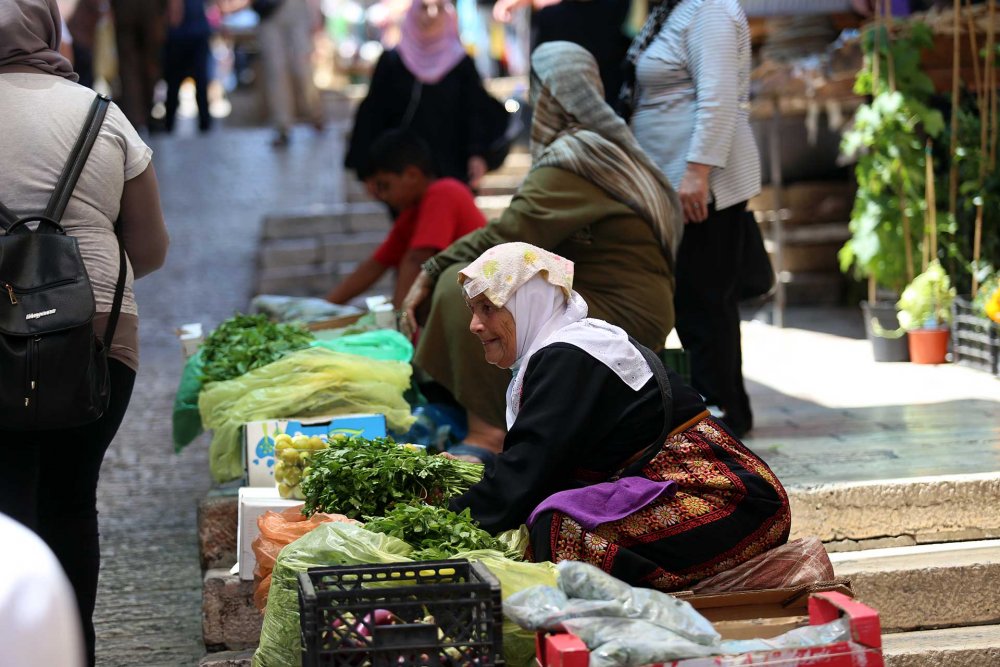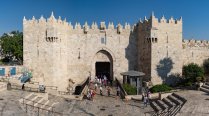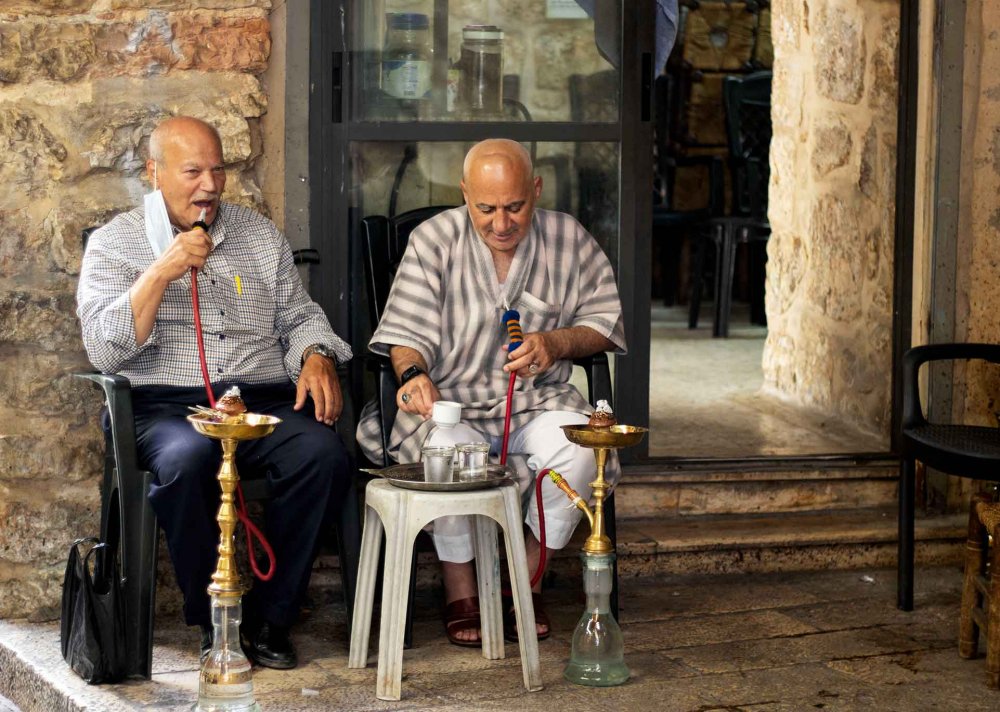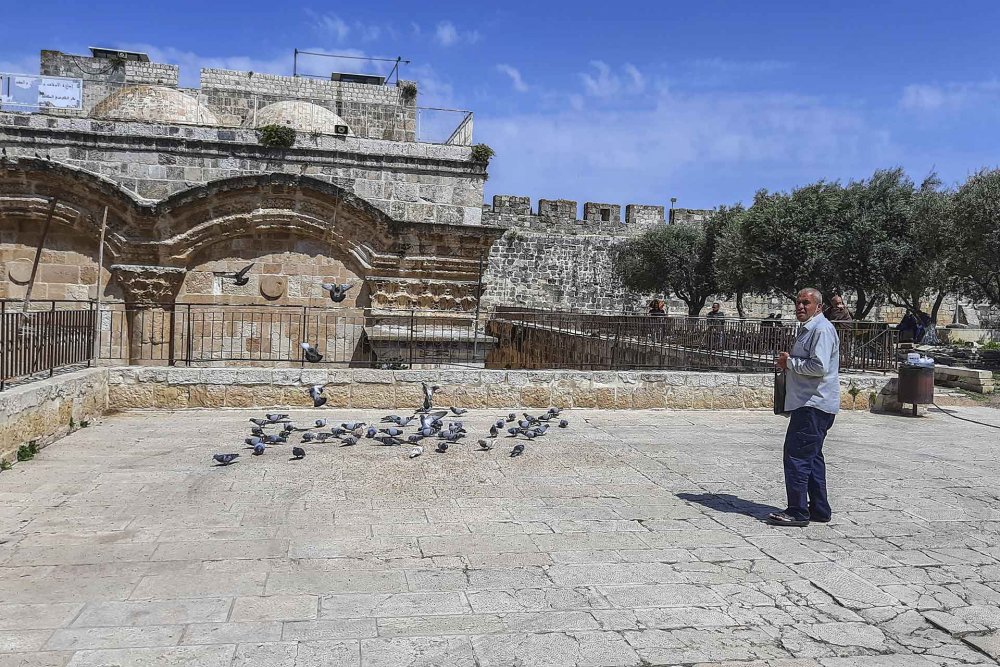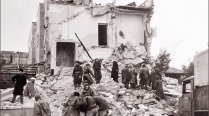Introduction
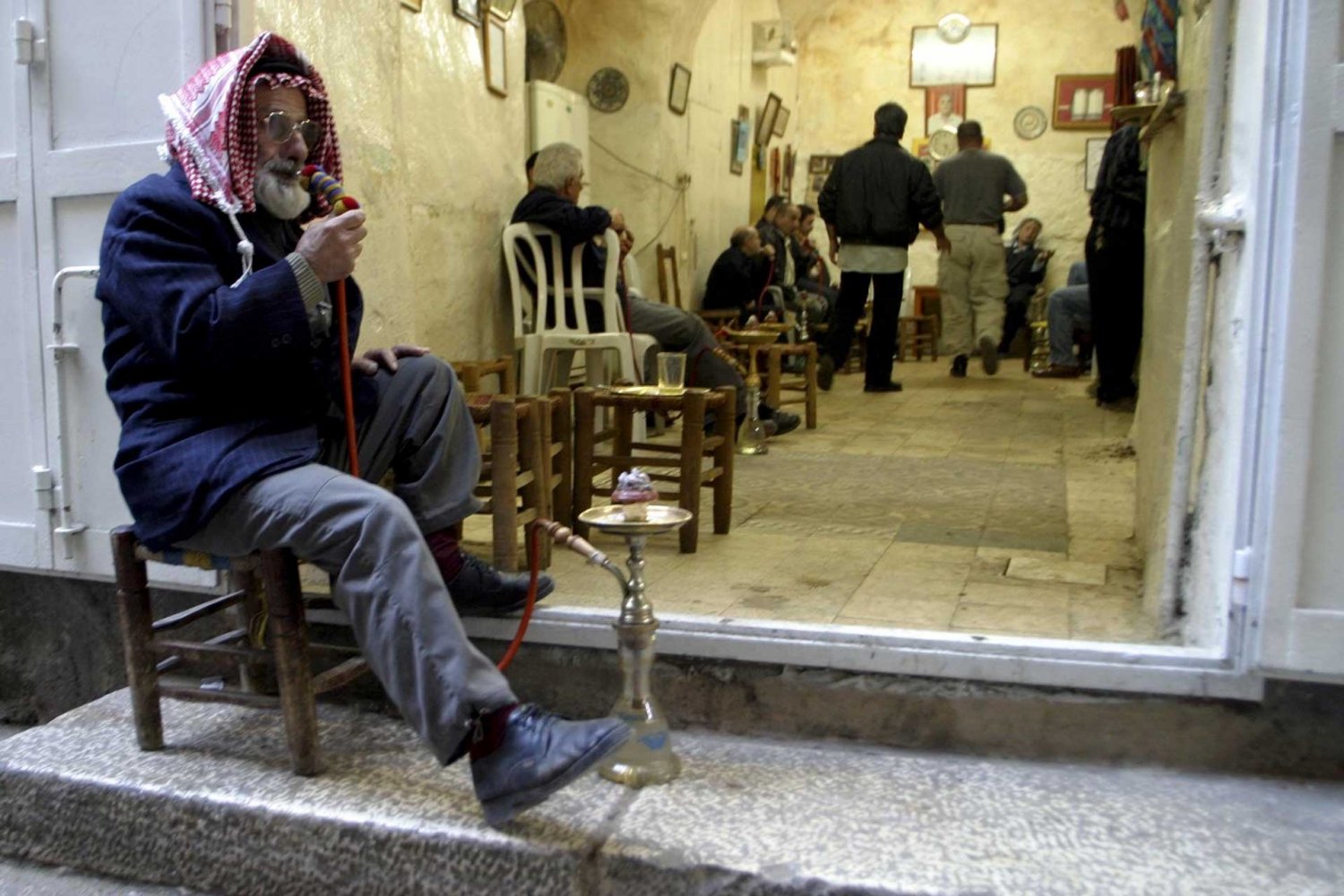
Credit:
Curtis Ackerman/Gamma-Rapho via Getty Images
The Mukhtar and I: A Day with My Grandfather in the Old City
Snapshot
A version of this essay was published in Salma Khadra Jayyusi and Zafar Ishaq Ansari, eds., My Jerusalem: Essays, Reminiscences, and Poems (Northampton, MA: Olive Branch Press, 2005).
Michel Moushabeck, a Palestinian American publisher, author, and musician, was born in Qatamon, Jerusalem. On his father’s side, Moushabeck is descended from a long line of Jerusalemites, dating back at least to the 1800s. His grandfather, Issa, known as Abu Michel, was the Mukhtar (the chosen head) of the Eastern Orthodox Christian Arab community in Jerusalem.
Abu Michel bought land in Qatamon in about 1922, attracted presumably by the wave of building in the New City that started around that time in the wake of the British occupation of the city. He also owned two properties in the Old City, a house and a café called Qahwet al-Mukhtar, where Palestinian literati of the time gathered.
With the exception of Almaza, Michel, and Elaine, who were born in the Old City, all the other Toubbeh children were born in Qatamon. The Toubbeh family lived in Qatamon for at least 26 years and had 10 children including Michel; seven of them were born in Qatamon.
During the Nakba, the residents of the Qatamon district were forced to leave their homes. That’s when Issa Toubbeh, being Mukhtar, was given residence in the Greek Orthodox Patriarchate in the Old City.
Moushabeck describes his reason for writing this essay: “If someone in a pub asked me to describe my family’s story in one phrase I would say: exile and starting over; exile and starting over; and exile and starting over. I would probably add a clarification that I did not repeat those phrases three times because I had too many beers. But my family’s experience of multiple exiles—from Qatamon [in what became West Jerusalem], to East Jerusalem, to Beirut, to New York—is not unique; it has become typical of the Palestinian experience. Our stories of exile, displacement, and injustice will live on, as will all our beautiful memories of our homeland. What follows is one such story, written for my Palestinian-American children to share one day with their children and their children’s children.”
The Mukhtar and I
The morning my grandfather and I took a walk together—after feasting on a breakfast of ka‘ek (over-sized sesame bagels) and bayd hammim (oven-baked eggs) that my grandmother bought from a street vendor by yelling and dropping a basket on a rope from the dining room bay window overlooking the market in the Christian Quarter—he turned to me and said, “Today you get to spend the day with Sido (grandfather); you are now old enough to come help me at the qahwe (café).”
The year was 1966 and I was barely 11 years old. We were living in Beirut. Often during the summertime my mother would take me, together with my younger brother and my sister, to visit Tata (grandmother) and Sido in the Old City of Jerusalem. It was a summer holiday I often resisted and fought against, for I preferred to spend my time on the beach in Beirut with my best friends Mounir and Imad instead of visiting my grandfather—a stern looking, tarboosh-wearing (fez-wearing), za‘ut-sniffing (snuff), narghile-puffing, mustachioed man, who to me looked more like an Ottoman Pasha than a grandfather, a man almost feared by everyone around him (at least that was my perception), someone who had never shown the slightest interest in me or any affection towards me.
I not only feared my grandfather, I was petrified by the sight of all the ugly, bearded monks who occupied the Greek Orthodox Convent where my grandparents lived after their forced exile from their home in the Qatamon Quarter. The intoxicating smell of incense and burning candles, the spooky, narrow, cobble-stoned alleyways of the convent grounds, the robed priests roaming around in the dark (they gave me the creeps every time they looked me in the eye and whispered kalimera and kalispera, which I didn’t know at the time meant good morning and good evening in Greek)—all contributed to a feeling of anxiety and discomfort I could do without.
My grandfather Issa Toubbeh, known to everyone as Abu Michel (father of Michael), was the Mukhtar (literally, the chosen), the head of the Eastern Orthodox Christian Arab community in Jerusalem, whom he dutifully served for over 50 years, as his father had done before him and his eldest son after him. As Mukhtar, he was given a residence inside the Convent, which consisted of several large, high-ceilinged rooms abutting the walls of Mar Ya‘coub (St. Jacob’s Orthodox Church) and the Holy Sepulchre, located on the Convent grounds. Two rows of sweet-smelling potted plants and flowers, including gardenias and jasmine, lovingly tended to by my grandmother Tata Maria, graced the front entrance of the house and provided a welcome antidote to the unpleasant and overpowering (at least to a child) holy scents one encountered along the way. From the rooftop—the makeshift playground my cousins and I frequented—the view of the Mount of Olives, the Dome of the Rock, the al-Aqsa Mosque, and the Church of the Holy Sepulchre overwhelmed my 11-year-old eyes every time I gazed in the distance.
Everyone spoke highly of my grandfather, the Mukhtar, and his important role in Palestinian society. Abu Michel was quite erudite and always commanded people’s attention and respect. He spoke fluent Arabic, Turkish, Greek, Armenian, and Russian. And he could even swear in English—with a posh British accent, nonetheless—something he picked up during his numerous dealings with the “cursed” British before their departure from Palestine in 1948. He survived the rule of the Ottomans, the English, Hashemite Transjordan, and the Jewish state, and was considered a shrewd and highly experienced problem-solver—a necessary prerequisite for the job of Mukhtar. His reputation as a successful mediator spread beyond his flock in the Eastern Orthodox Christian Arab community and his services were highly sought after by people in the Muslim as well as Jewish communities in Jerusalem. “Abused women rushed to our house for protection while their abusers waited patiently outside for the arrival of my father, the mediator,” my uncle Jamil once told me. It was also rumored that whenever my grandfather accompanied an entourage of men assembled for the purpose of asking for a girl’s hand in marriage, it was guaranteed that their request would be granted.
Such was the importance of my grandfather, the Mukhtar. But no matter what people said about him, no matter how much praise was bestowed on his position in the society, it never really impressed me much. My older cousin Basima once came up to me and proudly told me that she saw Sido’s picture in the newspaper walking next to the Greek Orthodox Patriarch of Jerusalem at the head of the procession on Easter Sunday. Big deal, I thought. My aunt Widad, the sweetest of my six aunts, bragged that no marriage in the community could take place without the official stamp of the Mukhtar on the marriage certificate; no birth could be legalized without his seal; no divorce approved without his counsel; no death authenticated without his presence. The more stories I heard about him the less affection I felt towards him. There is someone, I said to myself, who is doing good deeds all over town but has never said a kind word to me, let alone given me a grandfatherly hug. I was puzzled. How could a person have so much power over a community? Many more questions crossed my 11-year-old mind: Do I really have to get his approval before I get married? Will he stand in my way if I choose to marry the belly dancer I saw in the Beirut restaurant a month ago? Must I steal the round, brass seal with Arabic calligraphy he keeps chained to his vest in order to do so?
The side I saw of Sido was in stark contrast to his reputation on the street. The verbal abuse he often unleashed on my aunts (mind you, never on my uncles) was shocking. The time he yelled at my mother for her disrespectful act of lighting a cigarette in his presence, and his refusal to speak to her for several days afterward, was quite upsetting to me. The way he treated my Tata (the world’s kindest grandmother) was also painful to watch—especially the evening ritual of her taking off his shoes and socks and massaging his feet in a bowl of hot water for hours on end after his return from work. As if her days were easy when compared to his, I used to complain to my mother. I remember my mother scolding me one day for asking why he never massaged her feet as payback or reward for taking her away from her family at age 13 and impregnating her 10 times (not counting the several miscarriages she had to go through) without a break in between.
Spending time at home with my grandmother and watching her slave away in the house all day made me very resentful of my grandfather’s behavior. Maybe I felt this way because I grew up in cosmopolitan Beirut. Or maybe it was because I never saw my father treat my mother in this manner. I was too young to understand the role customs played on his behavior and attitudes, too naïve to fathom how deep-rooted in tradition some people can be.
But despite all this, I was not too young to understand that being “the grandson of the Mukhtar” had its benefits too. And I shamefully admit that I exploited them to the maximum. I wasn’t about to let these brief, unpleasant family episodes stand in the way of having fun on my summer vacation in Jerusalem. Everybody in the community knew the Mukhtar and, in very short time after my arrival, people everywhere would say: “Ah, you must be the Mukhtar’s grandson.” The local grocer would give me free sugar-covered chickpeas; the juice vendor, free lemonade. I got free ice cream, free falafel sandwiches, free bicycle rentals, free olive wood crosses (which I later sold to tourists a few blocks away), and—most important of all—free donkey rides. The Mukhtar connection opened so many doors for me that the Old City was soon transformed into one big amusement park. I would spend my days roaming the streets, going from quarter to quarter, hanging out with Hassan and Ahmad in the courtyard of the al-Aqsa Mosque while they waited for their father to come out of Friday prayer services, playing in and around the Church of the Holy Sepulchre with Charlie and George, sons of a souvenir store owner, and watching the mini-skirt clad ajnabiyyat (foreign women)—some pretty, I thought, but no match to the love of my life, the dark-haired belly dancer in the Beirut restaurant.
I had the freedom to go anywhere I wanted in the Old City—no worries there, since I was the Mukhtar’s grandson and the entire community would look after me (be responsible for my safety is more like it). My only condition was that I return to the convent before the 8:00 p.m. closing time of the small, studded, metal door carved in the center-bottom of the monstrous iron door that sealed off and protected the fortress known as the Greek Orthodox Convent. I was constantly warned about the closing time by my mother and always allowed ample time for the walk back home—except once.
It was Sunday evening and I was having so much fun flying Salim’s kite that I lost track of time. When I got to the convent, the dreaded metal door was shut. And that was a lesson to remember. The street was almost deserted and the amplified sound of occasional hurried footsteps on the cobble-stoned sidewalk did little to ease my fears. Alone, I stood outside the convent door sobbing for what seemed like eternity (it couldn’t have been more than 10 minutes) until a nice, elegantly dressed lady came up to me and uttered the magic words: “You must be the Mukhtar’s grandson.” She gently held my hand and let me rest my head on her chest (later I thought of marrying her too) until someone sent a message to the monk inside who unhappily came and opened the door. After I thanked and bade my savior goodbye, the monk with the foot-long keys hanging from his belt slammed shut the squeaky metal door behind us, and I quickly ran to the house—totally ignoring the angry Greek words he spewed in my direction.
The “walk” with my grandfather took place the morning after this incident. And I dreaded it. My time of scolding has come, I said to myself, especially after his total silence on the matter of the evening before. But to my surprise, there was no mention of it. Instead, he extended his hand to me and gave me a warm and loving look—something I was not accustomed to seeing. As we passed the frowning monk at the convent entrance, the one whose prayer I disrupted the night before, Sido looked at me and gave me a wink and a smile. That was the start of a day I will remember and cherish for the rest of my life.
The first order of the day was a visit to the Batrak, the grand old Patriarch of the Greek Orthodox Church in Jerusalem—a real treat and a privilege very few people get, Sido told me. I was not only special but also the oldest son of his youngest daughter, he went on to say (a reason only a real smoothie would think about). Our audience with the Batrak was very brief. I remember feeling dazzled by the opulence of his quarters, but had little time to absorb any details except for the long baton with the round, golden head the Batrak held in his right hand. I was not thrilled at having to kiss the wrinkled old man’s hand, and I had to do it twice—once at the beginning and another time after he placed around my neck a gold chain with a black and gold cross. This gift was special and would protect me from future evil, Sido quietly whispered in my ear, since the gold cross had inside it a wood splinter that came directly from the cross of Jesus Christ. (This valuable piece of information came in handy when I later sold the cross to my Lebanese Maronite schoolmate, who paid me the desperately needed Lebanese pounds to shower on the love of my life, the belly dancer, the next time I saw her.)
My memories of that day are as vivid and as bright as a silver coin in the sun. Sido and I, hand in hand, walked through the streets of Jerusalem, stopping every few paces to greet people he knew and those who knew of him. Along the way we passed the market, a bustling collection of colorful fruit and vegetable vendors. I instantly felt the flow of musical energy emanating from the place and its people. Music was simply all around: from the unforgettable melodic chanting of the muezzin’s call to prayer—often juxtaposed against the ringing of church bells—to fruit and vegetable vendors in the market singing praises about pickling cucumbers (as small as babies’ fingers) or prickly pears (so delicious they melt in your mouth); from the cheerful foot-thumping sounds of children practicing dabkeh dancing to the powerful emotional songs of Umm Kulthum blasting from transistor radios on window sills. To this day I am still able to close my eyes and transport myself back to the Jerusalem days. I am still able to smell the delicious food sold by street vendors, especially the wonderfully rich and evocative scent of roasted chestnuts and, of course, the sumptuous sweets drenched in syrup sold at Zalatimo’s; I am still able to see the old street photographer with the wooden camera whose head often disappeared underneath a black cloth; still able to touch the olive oil soap stacked in the long cylindrical towers at the corner store.
But the one thing that intrigued me most of all, the one person that had a profound influence on me, was the juice vendor who walked with his body leaning forward and his Bordeaux fez with the black tassels tipped back. Not only did he carry a big tank filled with sous, jellab, and lemonade on his back as he traveled by foot from neighborhood to neighborhood, but he was a percussionist of the highest degree. I was fascinated by how he announced his arrival, and mesmerized by how he played beautiful, intricate rhythmic patterns, using brass cups and saucers, to entertain customers and alert them to his presence—rhythms very similar to the ones the belly dancer in the Beirut restaurant moved her hips to. From that moment on I was hooked. I would sit on the sidewalk with my eyes fixed on the juice vendor’s hands so I could learn his art. Back at the house later on, to my grandmother’s horror, I would practice the same rhythms using her china, which produced disastrous results and, it goes without saying, a spanking. This marked the beginning of what was to become a life-long passion for Arabic music and rhythms.
Adjacent to Jaffa Gate was my grandfather’s long-established café. Known to family and friends as al-Mahal (the Place) and to others as Qahwat Abu Michel (Father of Michael’s Café) or Qahwat al-Mukhtar (the Mukhtar’s Café), the café was a renowned Jerusalem institution frequented in its heyday by the Palestinian literati, nicknamed al-sa‘alik (the vagabonds). According to my uncle Jamil, it was Palestinian author and educator Khalil Sakakini “who bestowed the title of sa‘alik on the group of intellectuals who met at al-Mahal. Members of the sa’alik included Yusef al-Issa, publisher and editor of the daily Alef Ba, and Issa al-Issa, publisher and editor of the daily Filistine, as well as Anistas Hanania, Adel Jaber, Ahmad Zaki Pasha, Khalil Mutran, Yacoub Farraj, and others.” Poets, musicians, historians, storytellers, folks who wanted to be seen in their company, young Palestinians who aspired to be like them, or simply those who just wanted to listen to the exchange of ideas taking place, gathered at al-Mukhtar’s café.
The café was buzzing with people when my grandfather and I arrived from the market. As we walked in the door, we were greeted by my uncle Mitri, who gave me a kiss on each cheek before going behind the counter to prepare an order of mezze for a customer. I was immediately put to work cutting cucumbers, chopping parsley, and preparing plates of olives and pickled turnips for the busy lunch crowd. Arak (a Lebanese alcoholic drink made of distilled grape juice flavored with anis) and narghile were present at almost every table, which accounted for the lively, albeit smoky, atmosphere of the place. For the next hour or so Sido attended to the business of recording births, deaths, and marriages in his oversized leather book, giving advice in between, and stamping official documents that required his seal. When he was done, he signaled to me with his walking stick to follow him to the café backyard, a large paved area with rows of plants on each side, a round tiled fountain in the middle surrounded by tables and chairs, and a massive cage that housed chickens and over a hundred pigeons.
As we sat in the sun and snacked on watermelon and Nabulsiyya cheese, he told me funny stories and answered the many questions I had stored up over the years. His answers to silly questions like “Why do you wear a tarboosh?” and “What’s that stuff you sniff and makes you sneeze all the time?” and more serious ones like “Why did you leave Qatamon?” and “Why did you not fight the Jews when they took your home?” kept me enthralled the whole afternoon. He told me about the bombing that demolished the Samiramis Hotel down the road from their house in Qatamon and how the blast that Menachem Begin masterminded at the King David Hotel, close to my uncle Michel’s office, instilled fear in the community and was the catalyst that drove many Qatamonians to flee their homes. I laughed when he described how one morning, on orders of Haj Amin al-Husseini, the mufti of Palestine, he received a delivery of antiquated guns and ammunition loaded on five donkeys to be distributed to the men in the community at a time when the Yahud [Jews] were parading the streets with tanks and cannons. I cried when he told me the story of the massacre that took place at the village of Deir Yasin. A quick change of subject to the art of pigeon flying restored my smile. And before we headed back home, he gave me an impressive demonstration by releasing all the pigeons and showing me how to fly them in a circle and then guide them back to their cage—all with only the help of a black piece of cloth tied to the end of a long stick. What he failed to tell me was that this exercise is done to attract other flying pigeons to the flock and ultimately back to the cage so that uncle Mitri could later serve them to the customers.
Back at the house that evening, while my grandfather rested his feet on a chair in the living room, Tata asked me to run over to the neighbor’s place to borrow a bowl of rice. Along the way, I met another neighbor who asked, “Where are you headed, son?” I told him about my mission to which he inquired, “Why? What’s going down at the Mukhtar’s house?” I shrugged and kept on going. My guess was that he told another in the neighborhood, and another told another, and in no time more than 20 or so family and friends descended on my grandparents’ house, which sent my grandmother—and a dozen or so female helpers—scrambling to the kitchen to prepare food for the guests. The feast and the festive atmosphere that ensued were like nothing I’d encountered before. Suddenly musical instruments appeared from nowhere, and poetry became the flavor of the day. While the men sang and played music in the living room, the women danced in the kitchen, and the children shuttled back and forth between the two. In between solo improvisations on the oud (a fretless lute), the qanoun (a zitherlike plucked instrument), and the nay (a reed flute), that brought sighs of appreciation, the singer sang soulful mawwals (vocal improvisations in dialect) and made up new lyrics to familiar tunes. I recognized many of the rhythms the juice vendor played and I was encouraged to join the musicians on the tambourine. The fun was interrupted when Tata ordered everyone to the dining room table. And what a table that was! There were keftas and kababs, hashwat jaj (chicken with rice and pine nuts), and kusa mahshi (stuffed zucchini), and meze plates as far as the eye could see: hummus (chickpea dip), babghannouj (eggplant dip), stuffed vine leaves, glistening black olives, braided white cheese, glossy vegetables, plump nuts, and lush juicy fruits. It was like magic: Where did it all come from? I wondered.
After stuffing ourselves to the chin (an Arabic expression often used by my mother), we all retired to the living room and the music resumed. This time the men and women danced together to the soothing and hypnotic compositions of Zakaria Ahmad and Sayed Darwish, Mohammed Abdel Wahab, and Farid al-Atrash. And I, naturally exhausted by the events of day, fell asleep on my grandfather’s lap.
Early the next morning, a crowd of family and friends lined up at the convent entrance to bid us farewell. We got into the service (taxi) that drove us to Amman and from there back home to Beirut. From the car window I waved goodbye to my teary-eyed Tata and Sido and yelled kalimera to the bearded monk with foot-long keys.
That was the last time I saw my grandparents; the last time I saw Jerusalem.

